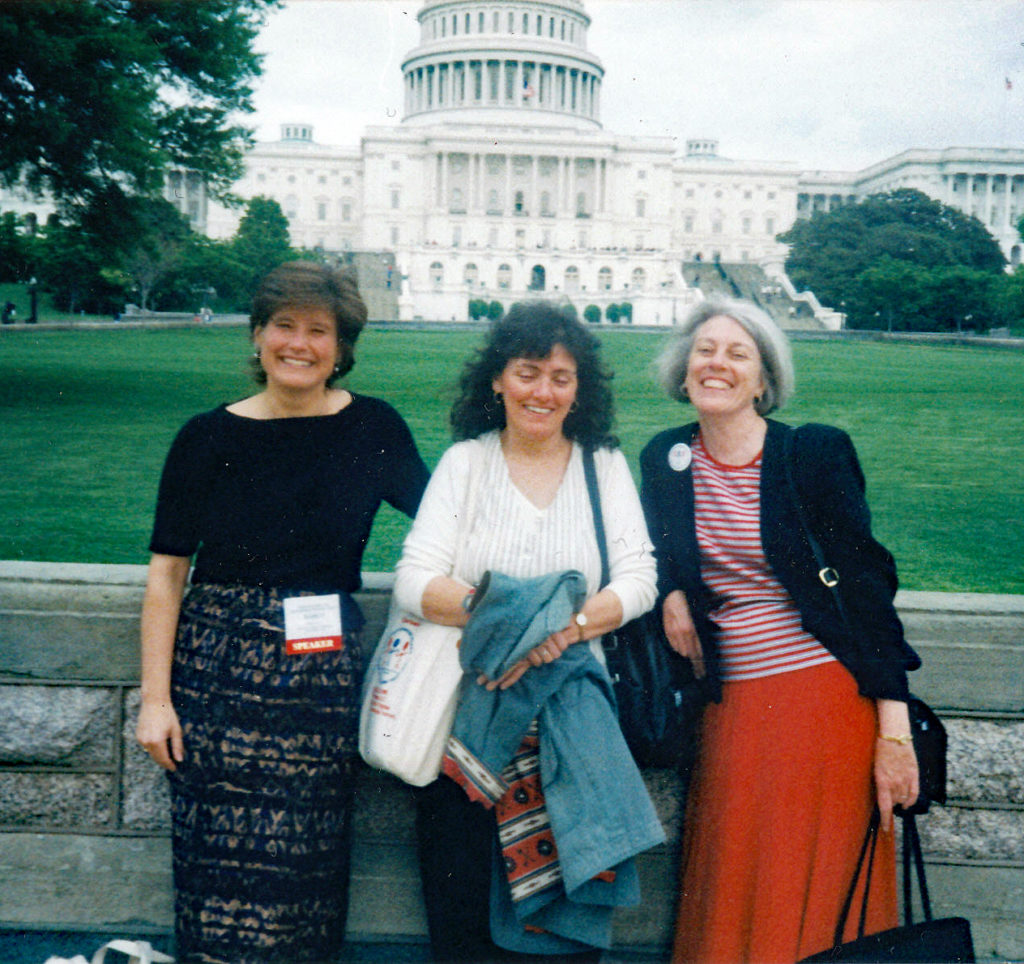
“All human beings are born entrepreneurs. Human beings are extremely creative and resilient, especially when they are operating within an institutional framework that encourages and supports their actions.” –Mohammed Yunus
Sheilah Rogers, a Canadian and Michigan native, had lived in Mendocino since 1972 and was going off to Vermont to pursue a dream to work abroad. She had been accepted into graduate school at the prestigious School for International Development in Vermont but little did she know pursuing her love for international initiatives would bring her right back to Mendocino.
In 1987 the James Irvine Foundation, a California-based grant making organization launched the Women’s Economic Development Initiative. They partnered with the Coalition for Women’s Economic Development, an organization dedicated to lifting women and people with low incomes out of poverty through what was then called, self-employment. In Ukiah, the Ukiah Community Center and Food Bank, an organization focused on emergency services for those with low incomes and without homes, was trying to figure out how they could address the root causes of what was going on the county. They applied for the four-year James Irvine grant and they got it. The only problem now was they needed someone to run it; someone who understood Mendocino County and its challenges, someone who had worked with small businesses, someone who understood how to empower women through economic development.
Sheilah had lived and worked in Mendocino since 1972, working at small businesses all over the county. She had also worked in New York, Chicago and Ecuador doing social work. She had just returned from graduate school in Vermont and recalls, “I had a friend who told me about the grant; she kept pushing me to apply for the position of program director. I was so focused on applying for international positions, I actually finally applied just to get my friend off my back — and then I found out I got the job!”
With Sheilah at the helm, the Women’s Economic Self Sufficiency Training (WEST Company) began. It was a heady time. Ukiah was only one of four California organizations to receive the grants, and WEST received additional funding from the SBA. There was a national movement of women getting out of poverty through owning their own businesses, although Sheilah recalls, “we didn’t even use the words business or micro-enterprise or startup back then! It was ‘self-employment.’”
While Sheilah had a good handle on working with small businesses in Mendocino, she had to quickly come up to speed on what the grants outlined. “Early on it was something familiar to me — I had already worked for small businesses and my own small business and I had worked with low-income communities to try to better their lives; it was something that I could do,’ Sheilah noted. But as she started reading the 100-page grant she realized the challenges ahead. “I didn’t really know a lot about lending or being a customer of a bank except from having my own personal checking account, so that was totally new territory.”
Sheilah also learned about the Grameen Model, an innovative community bank model that originated in Bangladesh. The idea was circle or solidarity lending. What this meant is that a small group of women who all owned their own small business, joined together. One received a small micro loan, and the others were there to support her business so she could pay it back. When her loan was paid back, another woman in the circle received funding. Mohammed Yunus, the professor who created the model, went on the win the Nobel Peace Prize for his pioneering work in what we now know as microfinance. When Sheilah found out that Mendocino native and friend Maggie Watson had actually gone to Bangladesh to study the Grameen Model, she hired her immediately! Sheilah also had to create relationships with banks who could eventually become lenders for WEST business clients.
“It was a really exciting time, we kept having to innovate as we grew. First women needed help starting their businesses, then they needed help with follow-on services, with lending. We had to address the advent of computers and teach people how to use them. We had a growing Latina population we wanted to help.” Sheilah took advantage of the national movement to help women out of poverty and started applying for more and more grants to meet the needs of women in Mendocino County. “I just started applying to every prestigious national grant I heard about – the Aspen Institute, FIELD, Ms. Foundation, and we started getting them! It connected us in on a national level with incredible support across the country for what we were doing.”
With this strong support in place, WEST was able to offer financing and lending themselves for the first twelve years. “Banks would give us money to lend out, and eventually we started transitioning over to having the banks do the lending themselves. We wanted them to step up and serve the community directly and they did.”
WEST offered support in four main areas: business plan training, to capital, access to markets (marketing strategies, trade shows, etc.) and ‘fourth pillar services’ with North Coast Opportunities: transportation, childcare, parenting skills and substance abuse. With funding from the SBA, they were able to expand services to men as well.
“We had so many artists in our community. Probably 40 percent of our first clients were artists,” Sheilah recalls. “Erica Fielder art and illustration, Nansee New ceramics Amy Melious photography, Laura Buckner jewelry and so many others making jewelry, ceramics, paintings–every kind of art you could imagine.”
WEST also had many notable businesses here in Mendocino– businesses like Cowlick’s, the Grey Whale Inn and many others. Service businesses, a Japanese maple tree business, a tortillas and tamales business, nurseries, elder care, tool makers, musicians, toy and utensil manufacturers, custom garment creation and alterations, skincare products and more all took full advantage of WEST Company’s assistance with business training and lending.
Erica Fielder noted, “Artists are in commerce no matter if you paint one canvas to sell or produce thousands of mugs. It took me years to realize this and with the help of WEST I started to focus on my expenses in and out, and create new ways to market to my customers.”
Sheilah looks back at her time starting up WEST fondly, “I really loved that I landed there it was even more fulfilling than I knew it would be and to get to meet women from all over and see the success of women — from their business to their personal Iives — it was just fabulous to see them getting there.”
Looking forward, Sheilah believes West Business Development Center’s services are needed more than ever. “When you look at what we were doing working to lift people up by giving them the tools to become self-sufficient, it was really a social movement. And social movements take long time to grow. The work West BDC continues to do is valuable in our community.”

